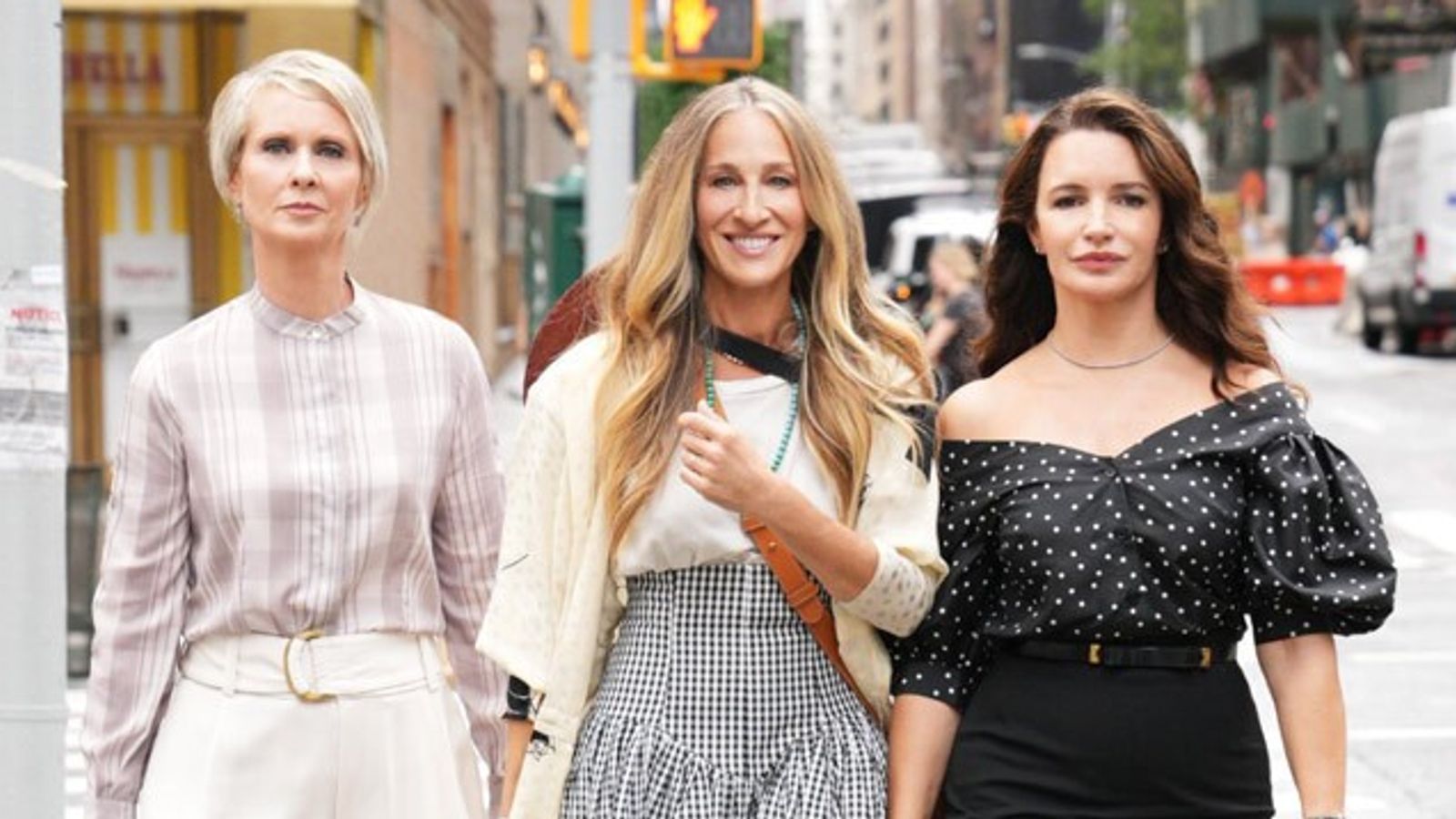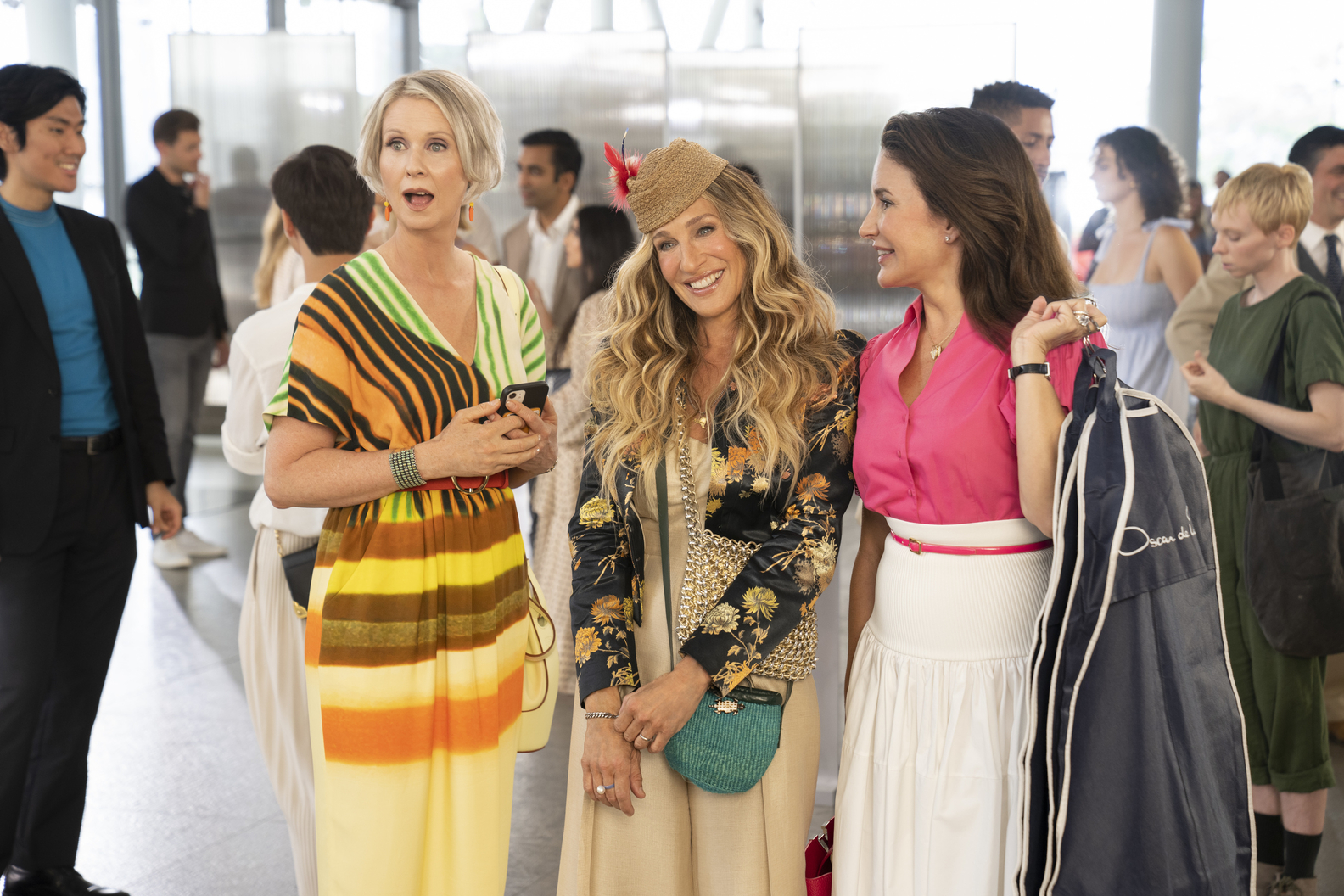For many fans, an ideal revival of Sex and the City would have been a carbon copy of its 90s form. You can easily envision it: Carrie, Miranda, Samantha and Charlotte sat around a table in an upscale Manhattan restaurant milling over the minutiae of their lives, only with the addition of some Instagram drama.
The show’s original premise worked because of the era Sex and the City was born in: its lead quartet were youthfully naive in the pre-recession 90s, apolitical to a fault, navigating a revolving door of relationships and flings while grappling with utopic imaginings of a working woman’s life. All the while, most importantly, they were dropping a ludicrous amount of money on brunches and Manolos. Expecting And Just Like That to replicate the original’s fantasy-like vision of the world was a fool’s errand, holding the series to a standard it could never feasibly meet two decades down the line.
When it premiered, critics went in hard on And Just Like That. The Telegraph described it as “tediously woke” whilst Empire called it “ham-fisted, inauthentic and riddled with self-consciousness, awkwardness and moments of self-congratulation”. The unanimous, almost gleeful scoffing at And Just Like That’s efforts to improve its racial and sexual homogeneity is uneasy because the ‘anti-woke’ criticism would track if this show was about anything other than, well, Sex and the City. The New York Times’ James Poniewozik described it as an “awkward bid at relevance” but by portraying queer sex and switching up the show’s once all-white version of New York, it’s not straying from its original mission statement — it’s simply expanding upon it. There’s still sex and there’s still the city.
What is ultimately skipped over in these conversations is that there was, unfortunately, an awful lot to improve on in the show’s original iteration, so much so that it’s understandable why And Just Like That is an original venture, shedding the show’s name. While many fans rightly don’t claim it, the execrable Sex and the City 2 was supposed to be the original ending for the show’s four women. As Lindy West infamously wrote: “Sex and the City 2 takes everything that I hold dear as a woman and as a human — working hard, contributing to society, not being an entitled cunt like it’s my job — and rapes it to death with a stiletto that costs more than my car.” It was always necessary for And Just Like That to rectify the movie version’s worldview, and go back to the drawing board.
In the original series Carrie, Samantha, Charlotte and Miranda had real life stakes and important things to talk about. The women rallied around each other in wake of death, cancer diagnoses, infertility, HIV tests… Yet, the last time we met her, in S*x a*d t*e C*ty 2, Carrie’s biggest concern was Mr Big buying a TV, an act that caused her to feel so ignored that she jetted off to Abu Dhabi with the girls to be racist and cheat on him. Ending the first episode of And Just Like That with Carrie cradling Mr Big’s body in her arms is an almighty course correction. She once again feels like a living, breathing person and, shorn of her often wince-inducing narration from early episodes, she has never been realer. Flawed though it is, And Just Like That has tried to salvage the legacy of a terrific show that transformed the depiction of women on-screen and reminded us that the grotesque materialism of the 2008 and 2010 movies was never its first priority.
But it’s safe to say that not all of And Just Like That works. It is almost proudly inelegant, rattling through plot developments with little wiggle room, introducing an array of new characters with very little, well, introduction, and giving its viewers tonal whiplash. Fans need a sexy tonic for its heavier themes and it’s a series that yearns for a libidinous one-liner from the mouth of the late, great Samantha Jones. Meanwhile, contradictory jokes are made about reactionary young people berating Miranda for misgendering and using outdated words. In the same breath, Charlotte navigates parenthood as the mother of a non-binary child.
That latter storyline is key to why And Just Like That feels necessary. Trans and non-binary children are seldom depicted in media that does not pivot around and pick apart their existence entirely. If Sex and the City is regarded as an iconic contemporary cultural depiction of womanhood then having one of their children — a character whose birth fans witnessed in the 2008 film — come out gives the franchise an authenticity it has lacked since its earliest days. It’s proof the show’s characters, while fallible, have come a long way from the days of Samantha being at war with a group of trans sex workers.
And Just Like That embraces these characters’ imperfections, never trying to erase them. Much has been made of the now-trio’s evolutions: Carrie from sex guru to prude; Miranda from cynic to well-meaning liberal; Charlotte from strait-laced to helicopter mom. But these feel like natural progressions, based on pre-established traits, for characters who were never flawless or fully-formed people. They were perfect to us, the fans, and within Sex and the City’s rose-coloured fantasy world. But in transplanting Carrie, Miranda and Charlotte to a closer approximation of reality, they’re no longer pop culture icons, they’re real, tangible people.
Yet for all its good intentions, there is no denying And Just Like That handles its weightier themes with sledgehammer subtlety. Sex and the City was many things — chic, aspirational, funny and sexy — but nuance was never it’s strong point. Carrie’s narration was often clunky (“When you’re tired you take a napa, you don’t move to Napa”) and the writing was broad. So perhaps the collective annoyance with And Just Like That stems from seeing these characters tackle issues like race, gender, ageing and queerness with the broadest strokes imaginable. It’s admittedly produced a disturbingly camp uncanny valley effect — hearing Charlotte York Goldenblatt talk about “non-binary sex” is surreal — but while the execution may be lacking, And Just Like That is a consistent continuation of its predecessor’s stylings.
Aspiring for better representation from Sex and the City is fruitless because it is a franchise that has always trafficked in stereotypes. Stanford, Carrie’s original GBF, was rarely afforded much respect, his love life routinely a punchline, his invitation to brunch only extended since the relaunch. The same extends to And Just Like That and the much-memed Che Diaz, Carrie’s ‘comedian’ boss and Manic Pixie Dream Non-Binary Person. They speak exclusively in godawful platitudes that feel like they’re setting back progress several decades, but it feels strangely fitting that the first gender non-conforming person Carrie Bradshaw befriends would exclaim “Yasss, queen” unironically.

Miranda’s recent queer coming out — getting fingered by Che in Carrie’s kitchen while baked out of her mind and drunk on tequila as Carrie pisses the bed — was a bold step into new territory. Aside from brief biphobic flirtations, Sex and the City never gave its original four a respectful queer experience (the trio’s response to Samantha’s segue into dating a woman was particularly egregious, even with all the goodwill afforded to a glory-era Carrie). Seeing Miranda, played by the robbed Governor of New York and gay icon Cynthia Nixon, explore her newfound desire was a genuine thrill, as Miranda, with her pessimism over men and love of a power suit, has always had a gay following. Critics can quibble over inconsistent characterisation but Miranda getting fingered was one for the fans.
Hadley Freeman, The Guardian’s resident defender of Sex and the City-based rights, recently wrote that, “it’s now fashionable to denigrate Sex and the City as too white and too naff, but it was a genuine cultural phenomenon that changed how women saw their lives”. This misses the point because to love Sex and the City is to acknowledge that it was both too white and too naff but, at the same time, still adore it for the once-revolutionary cultural phenomenon it was.
Contemporary critiques of Sex and the City’s myopia do not negate the fact it furnished millions with a revolutionary understanding of sex and friendship. In fact, queer people and people of colour have always been required to overlook its shortcomings and see the goodness at its core. The same now applies to this ungainly, stupid but loveable beast. Sure, it might be imperfect, but at least we now know that Carrie has read Detransition, Baby.


